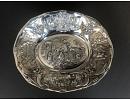Contact Seller
Burnell And Rowe
Tel07393 207160Please quote Antiques Atlas.


 Royal Worcester Cache Pot 1910
Royal Worcester Cache Pot 1910
 Royal Worcester Twin Handed Vase 1920
Royal Worcester Twin Handed Vase 1920
 Vintage Dessert Service, English, Ceramic
Vintage Dessert Service, English, Ceramic
 Portmeirion Pottery - Magic City – Coffee Set
Portmeirion Pottery - Magic City – Coffee Set
 Portmeirion Pottery - Magic City - Cylinder Vase
Portmeirion Pottery - Magic City - Cylinder Vase
 Wadeheath Pottery Disney Snow White & 7 Dwarfs
Wadeheath Pottery Disney Snow White & 7 Dwarfs
 Antique Victorian Staffordshire Flatback Figure
Antique Victorian Staffordshire Flatback Figure
 Royal Worcester Vase 1912
Royal Worcester Vase 1912
 Royal Worcester Miniature Two Handled Mug
Royal Worcester Miniature Two Handled Mug
 Royal Worcester Rouge Pot
Royal Worcester Rouge Pot
 Beautiful quality antique Edwardian bathroom set
Beautiful quality antique Edwardian bathroom set
 Collection of four antique Japanese imari plates
Collection of four antique Japanese imari plates
Non UK callers :
+44 7393 207160
Elephant Teapot by Wood's, Staffordshire, c.1930s


If you're looking for a teapot with real character then this charming double headed elephant is definitely the one for you! Made in the 1930s by Wood's of Staffordshire, this treacle glazed teapot features a happily smiling elephant at the front, whose trunk forms the spout and a rather down in the mouth one at the back, whose trunk forms the handle. Clearly the front end is the preferred option for these elephants!
The teapot is in lovely condition with no chips or cracks and appears to have had little if any use, having most probably been kept as a display piece. It is however fully functional and could be used to make tea if you wished to.
The teapot is 25cm from spout to handle, 13.5cm at his widest and stands 23cm tall to the top of the lid. The elephants weigh in at 1.07kg.
UK shipping is £7 by Royal Mail 48 Tracked & Signed Parcel Post.
Overseas customers please enquire about shipping costs before making a purchase.
SellerBurnell And Rowe
View all stock from
Burnell And Rowe

 Private dealer
Private dealer
Online only
Launceston
Cornwall, England
Tel : 07393 207160
Non UK callers : +44 7393 207160
The teapot is in lovely condition with no chips or cracks and appears to have had little if any use, having most probably been kept as a display piece. It is however fully functional and could be used to make tea if you wished to.
The teapot is 25cm from spout to handle, 13.5cm at his widest and stands 23cm tall to the top of the lid. The elephants weigh in at 1.07kg.
UK shipping is £7 by Royal Mail 48 Tracked & Signed Parcel Post.
Overseas customers please enquire about shipping costs before making a purchase.
Price The price has been listed in British Pounds.
Conversion rates as of 23/DEC/2024. Euro & Dollar prices will vary and should only be used as a guide.
Always confirm final price with dealer.
Category Antique Ceramics
Date 1930s
1930s Antiques Material Ceramic
Origin English
Maker Woods
Item code as1006a033 / IR1585
Status Sold
£40.00 
$50.08 
€48.19 

$

€

Conversion rates as of 23/DEC/2024. Euro & Dollar prices will vary and should only be used as a guide.
Always confirm final price with dealer.
View all stock from
Burnell And Rowe

 Private dealer
Private dealerOnline only
Launceston
Cornwall, England
Tel : 07393 207160
Non UK callers : +44 7393 207160
You may also be interested in
 Royal Worcester Cache Pot 1910
Royal Worcester Cache Pot 1910
 Royal Worcester Twin Handed Vase 1920
Royal Worcester Twin Handed Vase 1920
 Vintage Dessert Service, English, Ceramic
Vintage Dessert Service, English, Ceramic
 Portmeirion Pottery - Magic City – Coffee Set
Portmeirion Pottery - Magic City – Coffee Set
 Portmeirion Pottery - Magic City - Cylinder Vase
Portmeirion Pottery - Magic City - Cylinder Vase
 Wadeheath Pottery Disney Snow White & 7 Dwarfs
Wadeheath Pottery Disney Snow White & 7 Dwarfs
 Antique Victorian Staffordshire Flatback Figure
Antique Victorian Staffordshire Flatback Figure
 Royal Worcester Vase 1912
Royal Worcester Vase 1912
 Royal Worcester Miniature Two Handled Mug
Royal Worcester Miniature Two Handled Mug
 Royal Worcester Rouge Pot
Royal Worcester Rouge Pot
 Beautiful quality antique Edwardian bathroom set
Beautiful quality antique Edwardian bathroom set
 Collection of four antique Japanese imari plates
Collection of four antique Japanese imari plates








